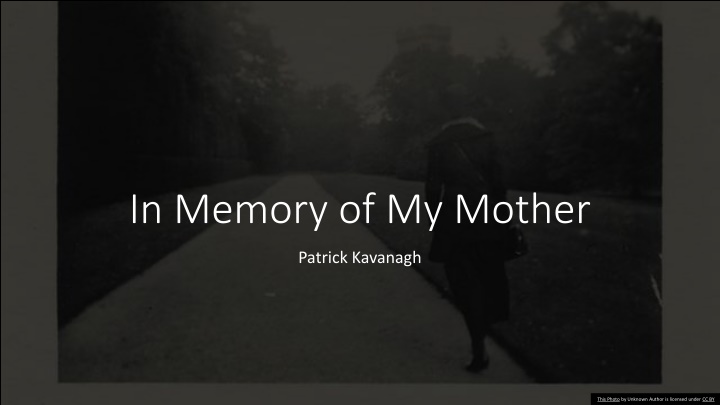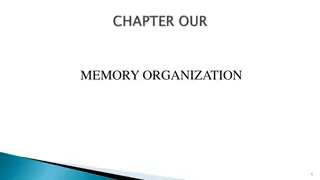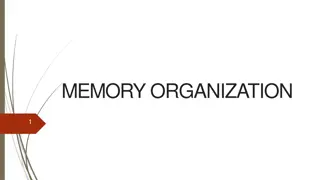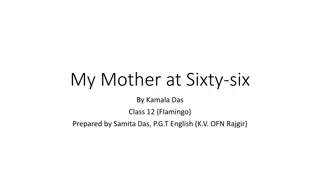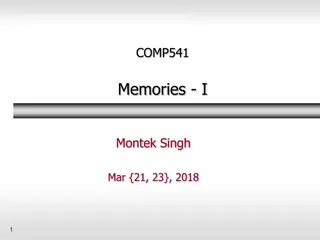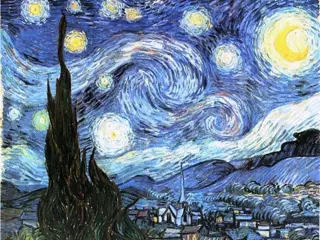A Tribute to Patrick Kavanagh's Poem "In Memory of My Mother
Patrick Kavanagh's poem "In Memory of My Mother" beautifully celebrates his late mother, portraying her as a cheerful and spiritual woman through vivid and affectionate memories. Despite her physical absence, Kavanagh keeps her alive in his heart with positive recollections, emphasizing the warmth and practicality typical of all mothers. The poem captures the essence of maternal love and the enduring bond between mother and child.
Download Presentation

Please find below an Image/Link to download the presentation.
The content on the website is provided AS IS for your information and personal use only. It may not be sold, licensed, or shared on other websites without obtaining consent from the author.If you encounter any issues during the download, it is possible that the publisher has removed the file from their server.
You are allowed to download the files provided on this website for personal or commercial use, subject to the condition that they are used lawfully. All files are the property of their respective owners.
The content on the website is provided AS IS for your information and personal use only. It may not be sold, licensed, or shared on other websites without obtaining consent from the author.
E N D
Presentation Transcript
In Memory of My Mother Patrick Kavanagh This Photo by Unknown Author is licensed under CC BY
In Patrick Kavanaghs In Memory of My Mother we are presented with a very vivid, interesting and wonderfully affectionate portrait of the poet s late mother. Although his mother is dead, Kavanagh does not want to focus on the sadness of her loss; rather he wants to celebrate her life and remember her as she was.
This poem is written in the form of an address to the poets mother, but it is an unusual one in that the person being addressed is no longer alive. However, by calling her you throughout and writing in the present tense rather than the past, Kavanagh ensures that his mother is very much alive in his mind and in his heart. Although she may be lying in the wet clay , the poet does not want to imagine her that way and dwells instead on happier thoughts of their time together.
Kavanaghs mother is portrayed as a down-to-earth, sensible, cheerful, spiritual woman. The poet remembers her walking happily to second Mass on a summer Sunday and, when she meets her son on the way, reminding him not to forget about the cattle. All Kavanagh s memories of his mother are positive ones. She is walking along a headland, shopping in the market or smiling up at her son as they work together to bring in the harvest.
In this poem, Kavanagh does not just give us a picture of his own mother, but of all mothers. A line that conjures up the clearest picture of the poet s mother is in the second stanza, when he gives her a voice and remembers her telling him not to forget about the cattle . This is such a practical and sensible thing to say, and so reminiscent of all mothers who seem to be continually reminding their children not to forget to do various chores that the reader can almost hear her speaking the line aloud.
Stanza 1 and 2 This poem is rich with words and phrases which bring Kavanagh s mother to life for us. In the first and second stanza, the poet describes his mother walking to second Mass on a summer Sunday . The detail second Mass makes this description realistic, and the sibilance throughout this line both evokes a sense of peace and reinforces the idea that the poet s mother is going happily on her way. The fact that the poet remembers a summer s day rather than a winter s one again brings his mother to life as that is a time of year connected to growth and new life. This Photo by Unknown Author is licensed under CC BY-SA
Stanza 3 In the third stanza, the poet once again connects his mother to growth and to life as he remembers her walking along a headland near a field of oats on a June day. The line which tells us that he sees her so full of repose so rich with life is very powerful. The words full and rich and show just how vividly the poet sees his mother in his mind s eye. This is no vague memory, but one which is so strong that we are enabled to share in it. This Photo by Unknown Author is licensed under CC BY-SA
Stanza 4 In the fourth stanza, Kavanagh describes his conversation with his mother as being like oriental streets of thought . This is an interesting image and makes us think of the Orient: a place considered exotic and exciting as well as a spiritual place where death is not viewed as an ending but rather the start of another life. It seems likely that Kavanagh and his mother discussed interesting and exotic topics as they walked through the market together. This Photo by Unknown Author is licensed under CC BY-SA
The most moving image in the poem is that in the last line. Kavanagh refuses to think of his mother as a dead body in the wet soil, but instead sees her helping to bring in the harvest and smiling up at him eternally . We are left with a clear picture of a loving mother who watches over her son forever. This Photo by Unknown Author is licensed under CC BY-SA
Theme: The main message of this poem is that we should appreciate our loved ones and treasure the time we spend with them. This bond is so strong, however, that even when they are gone, we may gain some comfort from seeing them in our mind s eye as Kavanagh does smiling up at us eternally
This poem could be used to answer a question on: Love Relationship Memory People Death and grief (Notes: Aoife s Notes)
